|
Pathway updates
Discharge
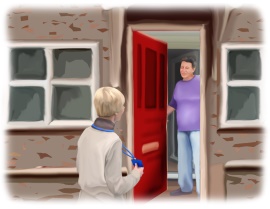 During the pandemic, Social Workers were withdrawn from hospitals and a new process called discharge to assess introduced. These changes have sometimes led to poor patient experience (especially for more complex patients) and inefficient working between teams. During the pandemic, Social Workers were withdrawn from hospitals and a new process called discharge to assess introduced. These changes have sometimes led to poor patient experience (especially for more complex patients) and inefficient working between teams.
The network attended the Greater Manchester Directors of Adult Social Services meeting at the end of last year and was able to establish links with key localities where there are particular issues. Extremely positive collaborative meetings between social care management, inpatient teams and the regional complex discharge service have now taken place in Bury, Stockport and Wigan, with clear plans for action agreed in all. Work will focus on establishing effective MDTs, communication and processes. In many Trusts, social care staff are now returning to wards which will also be of benefit.
Vestibular rehabilitation
We are working with colleagues across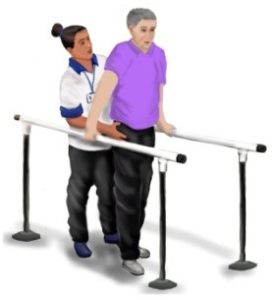 neurorehabilitation, stroke, falls, audiology and vestibular physiotherapy to map current pathways for vestibular assessment and rehabilitation across the region. The hope is that we will be able to share a comprehensive picture of the current pathways in place to increase awareness and appropriateness of referrals. We are also in the process of developing a model for vestibular assessment and treatment within stroke and neurorehabilitation services, alongside standardised assessment and screening tools. neurorehabilitation, stroke, falls, audiology and vestibular physiotherapy to map current pathways for vestibular assessment and rehabilitation across the region. The hope is that we will be able to share a comprehensive picture of the current pathways in place to increase awareness and appropriateness of referrals. We are also in the process of developing a model for vestibular assessment and treatment within stroke and neurorehabilitation services, alongside standardised assessment and screening tools.
Slow stream rehabilitation
We are working with our Integrated Care Board and NHS England to develop a case management structure for patients needing to access slow stream rehabilitation in the independent sector.
Individual Funding Requests (IFR) and Permissible Activity
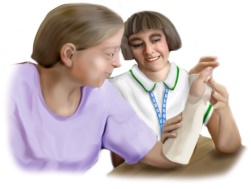 The Integrated Care Board have started a review of their Effective Use of Resource (EUR) policies, of which six apply to our services: Functional Electrical Stimulation (FES), Trophic Electrical Stimulation (TES) for Facial Palsy, Lycra, Communication Aids, Orthoses & 24hour Postural Management, and Cough Assist. These are currently managed under ‘Permissible Activity’ but there is question as to whether this is the appropriate commissioning arrangement. The FES and TES policies are currently under consideration and have had independent evidence reviews completed by public health commissioners. We have engaged with clinicians in our teams and submitted responses to these reviews and will be attending board meetings to discuss further with key clinical colleagues. The date for the FES review meeting is in mid July, with the date for the next TES meeting not yet set. The other policies will be reviewed during 2025 and 2026. The Integrated Care Board have started a review of their Effective Use of Resource (EUR) policies, of which six apply to our services: Functional Electrical Stimulation (FES), Trophic Electrical Stimulation (TES) for Facial Palsy, Lycra, Communication Aids, Orthoses & 24hour Postural Management, and Cough Assist. These are currently managed under ‘Permissible Activity’ but there is question as to whether this is the appropriate commissioning arrangement. The FES and TES policies are currently under consideration and have had independent evidence reviews completed by public health commissioners. We have engaged with clinicians in our teams and submitted responses to these reviews and will be attending board meetings to discuss further with key clinical colleagues. The date for the FES review meeting is in mid July, with the date for the next TES meeting not yet set. The other policies will be reviewed during 2025 and 2026.
Neurological longer term support
Our steering group have developed a model 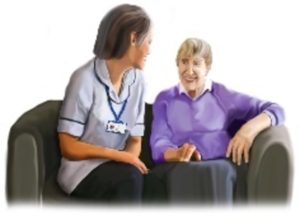 which will be piloted in the Bolton locality to test its feasibility. The purpose of the model is to identify the support required for an individual to ‘live well’ with a neurological diagnosis, and the pilot will test how this can be delivered in practice. The results of will inform the direction of the project moving forward and tie in with similar life after stroke pilot work now completed. which will be piloted in the Bolton locality to test its feasibility. The purpose of the model is to identify the support required for an individual to ‘live well’ with a neurological diagnosis, and the pilot will test how this can be delivered in practice. The results of will inform the direction of the project moving forward and tie in with similar life after stroke pilot work now completed.
Spasticity
 A successful advanced spasticity workshop was delivered by Tim Walton and Lynn Fletcher over the course of 1.5 days at Bolton University. This was accessed by specialist physiotherapy and occupational therapists from across the region and focused on therapeutic handling of spasticity. This will form part of an ongoing training programme overseen by the steering group. A successful advanced spasticity workshop was delivered by Tim Walton and Lynn Fletcher over the course of 1.5 days at Bolton University. This was accessed by specialist physiotherapy and occupational therapists from across the region and focused on therapeutic handling of spasticity. This will form part of an ongoing training programme overseen by the steering group.
Vocational rehabilitation
We continue to facilitate a Community of Practice and recently asked members to complete a confidence rating scale. An average improvement of 13% was found when compared with the same exercise in January 2023, highlighting the benefits for clinicians of meeting and discussing complex interventions. A national forum is being established and our Facilitator, Cillian O'Briain is involved in a steering group to support its development.
Driving guidelines (Neuro)
 Last year, we updated our stroke driving guidelines for professionals and this year we set up a task and finish group to develop similar guidelines for other neurological conditions. In May, we presented the guidelines at our Patient & Carer Group. Members offered invaluable feedback and shared personal experiences of returning to drive with a neurological condition. Some changes have been made to the guidelines and the final draft will go to our Clinical Effectiveness Group in the coming months for approval. Last year, we updated our stroke driving guidelines for professionals and this year we set up a task and finish group to develop similar guidelines for other neurological conditions. In May, we presented the guidelines at our Patient & Carer Group. Members offered invaluable feedback and shared personal experiences of returning to drive with a neurological condition. Some changes have been made to the guidelines and the final draft will go to our Clinical Effectiveness Group in the coming months for approval.
Motor Neurone Disease (MND)
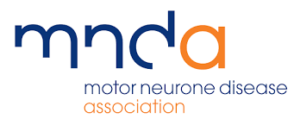 The MND project is reaching its final stages with completion planned for July. The network will ensure the project’s progress and legacy continue, for example, the biannual MND Steering Group is now ‘business as usual’, a library of resources collated through the project is available in our MND Toolkit and plans are in place to ensure MND professionals have access to relevant training. The MND project is reaching its final stages with completion planned for July. The network will ensure the project’s progress and legacy continue, for example, the biannual MND Steering Group is now ‘business as usual’, a library of resources collated through the project is available in our MND Toolkit and plans are in place to ensure MND professionals have access to relevant training.
The project has highlighted the need for further focus on emotional support services and we are currently working with others on a grant for further MND Association funding. The collaborative nature of this project has proved to be an exemplar approach to (mostly cost neutral/saving) pathway development which we will employ to explore development opportunities in MS later in the year. |
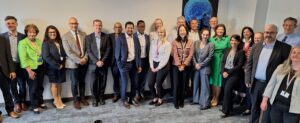

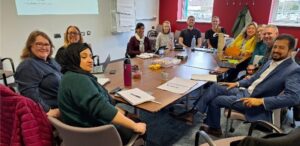 At the end of March, we said goodbye to our Community Clinical Director Tracy Walker after 8 years of sterling service. Our Inpatient Rehabilitation Clinical Lead Jenny Harrison also completed her tenure, with Fatema Mullamitha, our Community Stroke Lead finishing at the end of May. We would like to thank each of them for their enormous contribution, as well as passion and commitment to service improvement during their involvement with us.
At the end of March, we said goodbye to our Community Clinical Director Tracy Walker after 8 years of sterling service. Our Inpatient Rehabilitation Clinical Lead Jenny Harrison also completed her tenure, with Fatema Mullamitha, our Community Stroke Lead finishing at the end of May. We would like to thank each of them for their enormous contribution, as well as passion and commitment to service improvement during their involvement with us. 
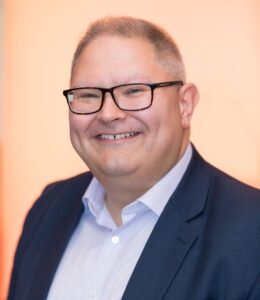 Dr David Rog and members of Multiple Sclerosis (MS) team at the
Dr David Rog and members of Multiple Sclerosis (MS) team at the  During the pandemic, Social Workers were withdrawn from hospitals and a new process called discharge to assess introduced. These changes have sometimes led to poor patient experience (especially for more complex patients) and inefficient working between teams.
During the pandemic, Social Workers were withdrawn from hospitals and a new process called discharge to assess introduced. These changes have sometimes led to poor patient experience (especially for more complex patients) and inefficient working between teams.  neurorehabilitation, stroke, falls, audiology and vestibular physiotherapy to map current pathways for vestibular assessment and rehabilitation across the region. The hope is that we will be able to share a comprehensive picture of the current pathways in place to increase awareness and appropriateness of referrals. We are also in the process of developing a model for vestibular assessment and treatment within stroke and neurorehabilitation services, alongside standardised assessment and screening tools.
neurorehabilitation, stroke, falls, audiology and vestibular physiotherapy to map current pathways for vestibular assessment and rehabilitation across the region. The hope is that we will be able to share a comprehensive picture of the current pathways in place to increase awareness and appropriateness of referrals. We are also in the process of developing a model for vestibular assessment and treatment within stroke and neurorehabilitation services, alongside standardised assessment and screening tools. The
The 
 A successful advanced spasticity workshop was delivered by Tim Walton and Lynn Fletcher over the course of 1.5 days at Bolton University. This was accessed by specialist physiotherapy and occupational therapists from across the region and focused on therapeutic handling of spasticity. This will form part of an ongoing training programme overseen by the steering group.
A successful advanced spasticity workshop was delivered by Tim Walton and Lynn Fletcher over the course of 1.5 days at Bolton University. This was accessed by specialist physiotherapy and occupational therapists from across the region and focused on therapeutic handling of spasticity. This will form part of an ongoing training programme overseen by the steering group. Last year, we updated our
Last year, we updated our  The MND project is reaching its final stages with completion planned for July. The network will ensure the project’s progress and legacy continue, for example, the biannual MND Steering Group is now ‘business as usual’, a library of resources collated through the project is available in our
The MND project is reaching its final stages with completion planned for July. The network will ensure the project’s progress and legacy continue, for example, the biannual MND Steering Group is now ‘business as usual’, a library of resources collated through the project is available in our 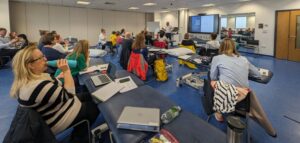
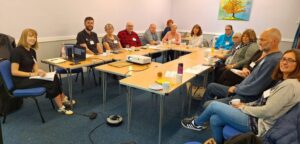 In January, we merged our stroke and neurorehabilitation groups which has proven hugely successful. Following an initial session of getting to know each other and how different conditions can impact lives, the next meeting in May (at a new venue) focused on some key areas including driving and longer term support.
In January, we merged our stroke and neurorehabilitation groups which has proven hugely successful. Following an initial session of getting to know each other and how different conditions can impact lives, the next meeting in May (at a new venue) focused on some key areas including driving and longer term support. 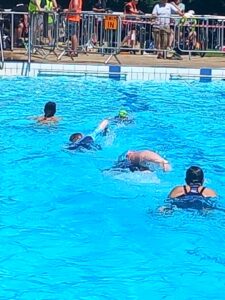 personally understanding the value of water therapy motivated me to contact her. I am very excited for this new opportunity and looking forward to working alongside the physiotherapists when a new assessment group runs. As a trustee with Bolton Neuro Voices I am well placed as a clinician and swimmer to support any queries arising throughout the network and look forward to hearing from you via email
personally understanding the value of water therapy motivated me to contact her. I am very excited for this new opportunity and looking forward to working alongside the physiotherapists when a new assessment group runs. As a trustee with Bolton Neuro Voices I am well placed as a clinician and swimmer to support any queries arising throughout the network and look forward to hearing from you via email 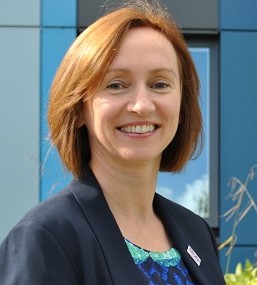 her researcher Trainee Psychologist Daisy Gibson to raise awareness of their study now open to recruitment:
her researcher Trainee Psychologist Daisy Gibson to raise awareness of their study now open to recruitment: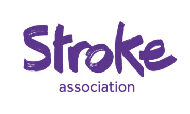 Stroke Association news
Stroke Association news years ago. The Stroke Association were highly honoured this year as she represented the charity at the RHS Chelsea Flower Show. Her recovery from stroke inspired her to design
years ago. The Stroke Association were highly honoured this year as she represented the charity at the RHS Chelsea Flower Show. Her recovery from stroke inspired her to design 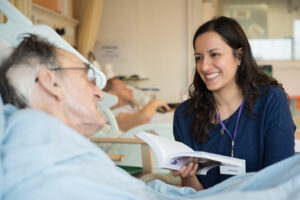 Just a reminder of a service that may be of interest to teams.
Just a reminder of a service that may be of interest to teams. 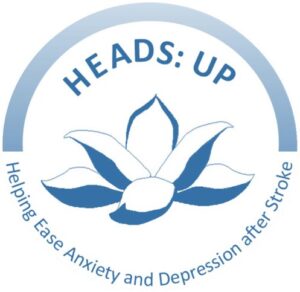 by Dr Maggie Lawrence in Scotland. T
by Dr Maggie Lawrence in Scotland. T